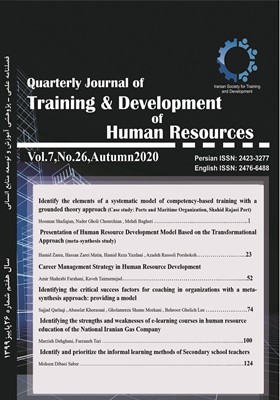Identify the elements of a systematic model of competency-based training with a grounded theory approach (Case study: Ports and Maritime Organization, Shahid Rajaee Port)
Subject Areas :Homan Shafighian 1 , Nadergholi GHourchian 2 * , Mehdi Bagheri 3
1 - Bandar Abbas
2 - Azad University
3 - Azad University
Keywords: Competency-Based Training, Learning Environment, Competency-Based Characteristics of Learners, Context of learning process, Desire for Self-Development and Achievement of Competencies.,
Abstract :
The purpose of this study was to identify the dimensions, components and indicators of model of competency-based training of Shahid Rajaee port staff. The Research is applied in terms of purpose, in terms of data is qualitative, and in terms of nature is descriptive. The statistical population consisted of key experts and informants in the subject area of the research who were selected based on informed approach and purposeful and snowball method. Data collection was done by library method (surveying) and field method (interviewing and Delphi). Interviews with focal subjects and theoretical saturation techniques, specific coding procedures, and validity of data collection techniques from multiple sources, negative case analysis, and method flexibility were used to validate the findings. Finally, theoretical coding technique was used to analyze the data. The results showed that the systematic model of competency-based training of Shahid Rajaee port staff has 8 dimensions, 27 components and 83 indicators that are the components of the final paradigm model: Causal conditions (learning environment); Interfering conditions (Competency-Based Characteristics of Learners); Contextual conditions (context of learning process); Core category (competency-based training); Strategies (Developing a Competency Model, ...); Consequences (effective training, Desire for Self-Development, etc.).
1.Burnette, D. M. (2016). The renewal of competency-based education: a review of the literature. The Journal of Continuing Higher Education, 64(2), 84–93
. 2.Cunningham, J., Key, E., & Capron, R. (2016). An evaluation of competency-based education programs: a study of the development process of competency based programs. The Journal of Competency-Based Education, 1(3), 130–139
3.Koster, A., Schalekamp, T., & Meijerman, I. (2017). Implementation of competency based pharmacy education (CBPE). Pharmacy, 5(1), 10
4.Asheghi, Hassan. Ghahramani, Mohammad. Ghourchian, Nadergholi. (2017). present a conceptual model for designing managerial training programs based on managerial competence: Qualitative research. Journal of Modern Thoughts in Education, 12(3): 47-61
. 5.Safai Movahed, Saeed. Falahnia, Hussein. (2016). Developing a Professional Development Program for Experts and Managers in the National Iranian Oil Company: A Qualitative Research. Journal of Human Resource Education & Development, 8: 97-122
. 6.Masumi, Alireza. (2013). Competency-based training. Proceedings of the Management Conference
7.Frank JR, Mungroo R, Ahmad Y, Wang M, De Rossi S, Horsley T. (2010).
Toward a definition of competency-based education in medicine: a systematic review of published definitions. Med Teach, 32(8): 631
-7 8.Koenen, A. K., Dochy, F., & Berghmans, I. (2015). A phenomeno graphic analysis of the implementation of competence-based education in higher education. Teaching and Teacher Education, 50, 1-12
. 9.Mojab, F. Zaefarian, R. & Dazian Azizi, A.H. (2011). Applying competency based Approach for Entrepreneurship education. Procedia and Behavioral Seiences, 12, 436-447
10.Prabawati, I., & AOktariyanda, T. (2018). Competency-based training model for human resource management and development in public sector. Journal of Physics: Conference Series, 953(1), 012157 IOP Publishing
11.Khorshidi, Abbas. Ekrami, Mahmoud. (2011). Identifying the constituent factors of managerial competencies. Journal of Forensic Management Studies, 4: 580-592.
12.Gravina, E. W. (2017). Competency-based education and its effect on nursing education: a literature review. Teaching and Learning in Nursing, 12(2), 117–121.
13.Moon Y. (2007). Education reform and competency based education. Asia Pacific Education Review, 8(2): 337-41.
14.Ramazani, Emran. (2009). Competency-based HR training and competency development approach. Second Human Resources Empowerment Conference. Tehran, Iran Human Resources Empowerment Foundation
15.Arman, Mani. Khosravi, Mahboubeh. (2012). Validating Competency Based Approach to Human Resource Training. Management studies in development & evolution, 22(71): 49-73.
16.Soheili, A. Hemmati maslak, M. Mohammadpour, Y. Khalkhali, H. Rahmani, A. (2015). The effect of implementing competency based education model on nursing students’ Clinical Performance in Coronary Care Unit. J Urmia Nurs Midwifery Fac, 13(9): 728-738.
17.Mohseni, Kobra. Moradi Doliskani, Morad. (2013). Identification of professional qualifications of the staff of Tehran Technical and Vocational Center based on Borich model. The 5th National Conference and the Fourth International Conference on Skills and Employment
18.Naderi, A. Baghaei, R. Mohammad por, Y. Aliramaei, N. Ghorban zadeh, K. (2012). Comparison of the Effect of Competency-Based Education Model and Traditional Teaching on Cognitive and Clinical Skills Learning among ICU Nursing students. Iranian Journal of Medical Education, 12 (9): 698-708
19.Singla P, Rastogi K, Sunita KM. (2005). Developing competency based curriculum for technical programs. India; National Symposium on Engineering Education
20.(Balakrishnan, S. (2005). Competency Based Education System. India Institute of Science, Bangalore.
21.Evans, Matt H. (2011). Competency Model. January 2, 2011. Retrived form, http://www.exinfm.com/board/competency_models.htm
22.Nawaz, Muhammed & et al (2013). The Professional Development of Employees in Banks of Pakistan: A comparative study of public and private banks in Punjab Pakistan. International Journal of Learning & Development. ISSN 2164-4063, 3(5).
23.Oni, E.O. Mukaila, A. Ijaiya. & Musa, Mohammed. (2013). Assessing the Impact of Training and Management Development in the Nigerian Banking Industry. International Journal of Business and Social Science. 4(5): 41-49
24.Kadkhodaie, Mahboubeh Sadat. Akhavan Tafti, Mahnaz. Rezayat, Gholamhossein. Ahmadi, Parvin. (2017). Designing a Competency-Based University Teaching Model for the Humanities. Iranian Journal of Higher Education, 9 (1): 105-131.
25.Byham M. (2002). Competency-based human resource system. Dev Dimens, 16(2):11-46. Clark, J. & Armit, K. (2010). Leadership competency for doctors: a framework. Leadership in Health services, 23, 87-100.
26.Ellerbusch, M. Kellie, Calkins F. Carl, Sanddal Nels (2007). Designing Competency- Based Instruction. UMKC Institue for Human Development. http//:WWW.IHD.UMKC.edu.

